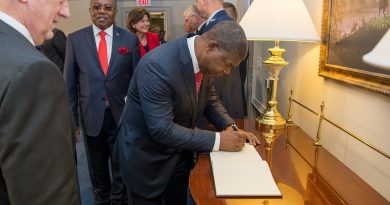Obama and the Middle East: An Overview of the Past Eight Years
In his farewell address, the President of the United States, Barack Obama, summed up his past eight years in office, concluding that the United States was now in a better place than when he moved into the White House. As part of his accomplishments, he listed some US actions in the wider Middle East region. Carefully choosing his words, without going into detail, President Obama’s speech reflected the extremely sensitive nature of events in the region, probably the most complicated conflict in the world.
During his mandate, President Obama faced a series of problems in the Middle East, some inherited from President George W. Bush, others arising later on. It is difficult to assess whether President Obama’s efforts in this context were positive overall but it is worth going through some of the specifics.
1. Iraq
The US invasion of Iraq led by President George W. Bush completely changed the overall picture of the Middle East and geared it towards conflict to which no end can currently be seen. In toppling Saddam Hussein’s dictatorship, the US destroyed his security apparatus without even coming close to the development of a new one. Instead, they created a vacuum which was gladly filled by different groups which Saddam previously never allowed to see the light of day. The result of all of this has been disastrous, and Iraq today represents an example of the wrong kind of policy from the West whereby, in an attempt to impose so-called “democratic principles” of Western culture in a part of the world which has its own rules, culture, history and politics, completely failed.
US policy planners completely ignored the facts on the ground which showed that Saddam in fact served as a barrier against the spread of Al-Qaeda in that region and not its collaborator. In the resulting vacuum, Al-Qaeda had plenty of room to act. President Obama attempted to stabilize local government in Iraq, to support them in establishing a new security system, regardless of who they ended up collaborating with, as long as they fought against Al-Qaeda and subsequently the Islamic State.
Did he succeed? Probably not. Is he to blame for this failure? Probably not.
2. Syria
During President Obama’s mandate, the Syrian conflict developed from unrest the context of the “Arab Spring” into a classic civil war. The number of warring parties in the conflict consistently increased and culminated with the entry of the Russian Federation. It is now in a phase in which one segment of the internal conflict is deliberately being minimized or closed in order for focus to be placed on the other. In terms of external influence on Syria, the US has remained dominant, but with the quiet acceptance of Russia’s role which has not only saved the regime of Bashar al-Assad but is also strengthening it quickly. Why? Because of the existence of a much more dangerous threat, the Islamic State, which remains active in Syria without significant obstacles in its way.
The conversation today is no longer about strengthening democratic forces in Syria, but more about saving the authority of a government with which the international community will have to have to deal with in order to strengthen the front against the Islamic State. While a large offensive of coalition forces under US leadership against the Islamic State is still expected, it clearly will not happen during the Obama administration, leaving the outgoing President with no particular achievements in efforts to resolve this conflict. The sole positive aspect of American involvement in Syria has been its reluctance to do anything. The opposite course of action would have been sending troops into that country and thereby deepening the US role in the civil war. Despite facing pressure from all sides on this issue, President Obama remained faithful to his decision.
Was President Obama’s policy in Syria satisfactory overall? Probably not. Should he be congratulated for what he actually did not do? He definitely should.
3. Israeli-Palestinian Conflict
A lot was expected at the beginning of President Obama’s mandate especially in this part of the Middle East. The President showed great desire in re-energizing the role of the US as facilitator in the negotiations between the Israelis and the Palestinians. US involvement during this time, however, went through the pattern of initial ambitious plans for the negotiations, followed by some modification in attempt to bring the parties to the table, then interventions with decreased or a minimum of interest which would subsequently disappear completely. President Obama and Secretary of State, John Kerry, almost completely withdrew the US from this conflict, particularly facing the catastrophe in Iraq and the war in Syria.
The right-wing Israeli Government did not see any particular problem in that inactivity because the status quo, in which neither side was willing to negotiate without preconditions, allowed it to implement its policies of expanding Jewish settlements in the West Bank, military intervention in Gaza, strengthening the security of Israeli airspace and concluding a new long-term financial agreement with the US on military assistance. On their side, the Palestinians demanded an end to settlement expansion as a precondition for the renewal of talks which they were not able to receive. Instead, the Abbas-led Government focused on strengthening the position of Palestine’s international position (e.g. membership in UNESCO and upgrading position in the UN General Assembly). Meanwhile, no success was made in resolving the conflict between the Palestinian Liberation Organization (Fatah) and Hamas which would certainly raise a legitimacy issue for the Government in Ramallah if negotiations did resume.
Could President Obama have done more in this area? Probably not. Is he to blame? Not at all.
4. Iran
With considerable efforts, the US succeeded in concluding an agreement with Iran on putting a stop to the nuclear weapons programme in that country. The agreement had many critics but none of them were able to point to a better solution except for the military option which Washington had no interest in pursuing. The agreement was mot criticized by Israel which certainly did not agree with the lifting of sanctions against Iran or its involvement in Iraq with the “blessing” of the US. Given the great divergence on this issue between the Governments in Washington and Jerusalem, their disagreement became overtly public.
Israel believes that the nuclear agreement only serves to strengthened Iran’s position which could, according to the Israelis, easily reactivate their nuclear programme if they are not already maintaining in secret. The détente between Iran and the US certainly does not suit the Jewish State as it completely reshapes the position of one of its greatest enemies in the region.
Was President Obama wrong in concluding the nuclear agreement with Iran? Probably not. Did he have any other viable option? Definitely not.
Overall, President Obama’s greatest success in the Middle East came from what he did not actually do
While that may sound absurd, it certainly is not given that the conditions for US intervention in Syria were established. Only President Obama’s decision to that effect was missing which, fortunately, was never made. It could be said that the previous administration under President George W. Bush contributed significantly to the complication of the situation in the Middle East, along withprocesses which the US could not actually control. President Obama’s responsibility for the situation in the Middle East is therefore not nearly as great as it could have easily been. His policies were more in the form of “damage control” and reflected American public opinion that clearly rejects further military actions around the world regardless of the justification for them.
It seems that the Middle East will remain, for future US administrations, a very difficult region in which their actions will be measured by who made the least mistakes. President Obama certainly belongs to those with the fewest mistakes. Despite this assessment, his contribution stands in stark contrast to the hope expressed in his speech at Cairo University in 2009, which was the primary factor in the President being awarded the Nobel Peace Prize, if that speech is even remembered today.
U.S. President Barack Obama meets with military leaders from 22 nations to discuss strategy in the Middle East, 2014.DoD Photo by D. Myles Cullen / Public domain
![]() This work is licensed under a Creative Commons Attribution-NonCommercial-ShareAlike 4.0 International License.
This work is licensed under a Creative Commons Attribution-NonCommercial-ShareAlike 4.0 International License.




